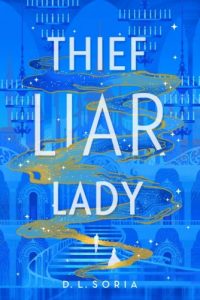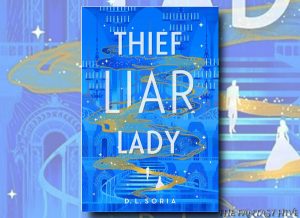THIEF LIAR LADY by D. L. Soria (BOOK REVIEW)
‘Truth is what we make it to be’
D. L. SORIA is the author of Thief Liar Lady, Iron Cast, Beneath the Citadel, and Fire with Fire. She lives with a clingy cat and spends her time trying to come up with bios that make her sound kind of cool. She has yet to succeed.
 We have all heard the fairy tales. Our parents would lull us to sleep at night reading dreamy tales of mystery and quests, princes and princesses, true loves first kiss and ‘breaking the spell,’ all to end with our young lovers (always true love, remember. Love at first sight. Eyes locking across the ball room. and so on and so forth), holding hands and walking into the sunset of ‘happily-ever-after.’ As we all know, these spellbinding tales are myths, legends, pretty stories to help the young mind explore feelings, adventure, experiences and help them to dream magical dreams. The world of ‘Cinderella,’ is no different. We all know the story of the evil stepmother, ugly step sisters, the fairy godmother and the magical night at the ball that changed our protagonists life for ever. D. L. Soria reimagines our story as anything but a story of true love and happy endings, where are protagonist can, herself, be seen as a villain, and I ended up feeling quite indifferent about every character Soria penned to the page. So, let’s dive right in and talk about ‘Lady Aislinn,’ or Ash, her real identity, and the absolute mess she makes of her own mission.
We have all heard the fairy tales. Our parents would lull us to sleep at night reading dreamy tales of mystery and quests, princes and princesses, true loves first kiss and ‘breaking the spell,’ all to end with our young lovers (always true love, remember. Love at first sight. Eyes locking across the ball room. and so on and so forth), holding hands and walking into the sunset of ‘happily-ever-after.’ As we all know, these spellbinding tales are myths, legends, pretty stories to help the young mind explore feelings, adventure, experiences and help them to dream magical dreams. The world of ‘Cinderella,’ is no different. We all know the story of the evil stepmother, ugly step sisters, the fairy godmother and the magical night at the ball that changed our protagonists life for ever. D. L. Soria reimagines our story as anything but a story of true love and happy endings, where are protagonist can, herself, be seen as a villain, and I ended up feeling quite indifferent about every character Soria penned to the page. So, let’s dive right in and talk about ‘Lady Aislinn,’ or Ash, her real identity, and the absolute mess she makes of her own mission.Soria immediately frames the novel as a ‘piss take on Cinderella,’ or, as I said to a friend ‘Cinderella, but make it dark.’ Immediately, the reader is informed that ‘Lady Aislinn,’ is positioned in the castle, she has a hidden agenda and is attempting to free an Elorian prisoner from the castle dungeons. For 20 years Solis (the Kingdom our story is set) and Eloria (the neighbouring city/kingdom) has been in a ‘disagreement.’ There was a war, the entire royal family of Eloria was killed, apart from the youngest son who is now the ‘hostage prince,’ allowed to live in Solis. For almost (or around) two decades, Solis has been in control. in control of Eloria, the Elorians (who commonly appear throughout as servants/ maids / guards/ workers), the refugees and their camps, the boarders between Eloria and Solis and all political or public opinion on the matter. This control has been woven so inexplicably well into the narrative, that I am not entirely sure why or what has occurred to kick it all off in the first place. What I do know, is that Eloria has the means to obtain/find/create ‘Lustre,’ a substance that many use for its magical purposes, learning how to cast spells, cure ailments or event trick the prince of Solis to fall in love…
“My transformation from a poor, orphaned scullery maid into the enchantingly mysterious lady who snagged the heart of the prince did not happen – as the rumours insisted – in a magical metamorphosis of pumpkins and glass slippers.”
Lady Aislinn, was Ash. A nobody. A nobody with a tenuously noble birth, but by no means a member of the court or anywhere near being considered a member of Solis’ aristocracy. Her ‘evil stepmother’ has trained and manipulated Ash to play the perfect part or a ‘lady’ to help her snatch a rich noble husband, to help her own daughters prospects (who are never actually called ‘ugly,’ but the fact she felt that her stepdaughter could do the job better than her own girls implies that Ash had the beauty needed to pull oof such a stunt). She taught Ash everything that was necessary, including how to utilise Lustre to fascinate, infatuate and seduce her future husband, whoever that may end up being. Ash plays the part of Lady Aislinn, and captures the attention of Prince Everett, at his birthday. The story the entire kingdom hears is the magical glass slipper tale of Cinderella, akin to Disney’s 1950 adaptation, but the reality is that this princesses happily ever after is a scam, to do her step mothers biddings and help Eloria, however she can.
‘you’re nobody,’‘Only a nobody can be anything they want’
Soria balances the magical/fantasy attributes of the tale really nicely with the realistic pessimisms of a world that was still suffering the hangover from war. Such as the whimsical use of Lustre as a magical powder that could cause infatuation, sleep, or forgetfulness weighed against the acknowledgement that those who work creating and refining the Lustre end up severely ill and diseased (possibly alluding to similar real life instances of factory work harming the workers, such as Radium Girls, Bhopal, or Asbestos manufacturing), suffering with ‘Lustre-Lung,’ blisters and severe pain for the rest of their days. Soria highlights the performative nature of Gender, heteronormative expectations surrounding our mental and physical capacity and the (sometimes silly) traditions that litter society – in doing so, Soria highlights not only the prevalence and relevance of these in the society today, but also the insistence and ever present-ness of these common factors within fairy tales. I do hope my word vomit makes sense, as it is quite hard to nail down precisely how Soria does this, but it is clear as to why – to highlight the performative and fictional nature of fairy tales – emphasising that they ARE NOT REAL. If somethings seems too perfect or too much like a fairy tale, question it, remember, “the devil doesn’t come dressed in a red cape and pointy horns. He comes as everything you’ve ever wished for…”
However, this is not the main agenda of the narrative. This is a minor aspect that I felt I should point out because I respect it. The story is more of an upside down love story, with unexpected and graphic sex scenes that you would not find in the usual bedtime fairy tale, (changing my description to ‘Cinderella, but make it spicy.’) and one might blush to read (depending on how spicy you like your fantasy fiction). The romance is raw and powerful, but still, no matter how much I WANTED to side with Ash, I mostly just wanted the best for the Elorians. I didn’t find myself caring much about her sex life, fake life, marriage or grouchy vanilla husband. I didn’t even feel that sorry for the husband she tricked, because… he came across as patriarchal, controlling, sexist and 2 dimensional (which I feel was entirely intentional). Other characters we are exposed to have a detailed and complex character, with nuance and realism that makes you feel you actually know them, even if you cannot emotionally connect with them. The pain, and grief and panic is real and you can sense it as your fingers touch the page. Soria uses emotions sparingly, so when emotive plots emerge, it strikes you hard.
Whilst the majority of the novel is reasonably realistic (or realistic adjacent – add magic) the end of the novel was anything but expected or realistic. I will not divulge the ending here, as I feel you should read the novel yourself, but what I will say is that happy endings come in many different varieties, they do not always have to end with a kiss, a walk into the sunset or a royal wedding. Sometimes happy endings are for nobodies, “And that means, we can be anything we want.”
Thief Liar Lady is available now and will be released in paperback this week! You can order your copy on Bookshop.org

